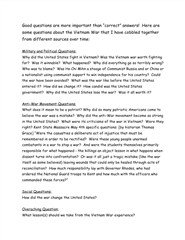Hello everyone. Happy to take any questions on the video and to work through any issues that may arise from your viewing of it! Erik Christensen if you post your question here, I can answer it!
Hello everyone. Happy to take any questions on the video and to work through any issues that may arise from your viewing of it! Erik Christensen if you post your question here, I can answer it!
This is a great question and I would also say to students that whilst narratives change, there are always events that are similar. I have likened it to the school day before - there are set times/events…
Right, sorry about that last attempt! I'll try to recall my question from yesterday...
First, what a beautiful and helpful talk you published. I really enjoy watching teenagers develop...and then answer…
Good divergent essential questions are important. You need to take the time to develop the questions and Nick Dennis is right you cannot answer complex questions in one lesson. They are enjoyable and thought…
Good divergent essential questions are important. You need to take the time to develop the questions and Nick Dennis is right you cannot answer complex questions in one lesson. They are enjoyable and thought provoking to answer but can be hard to make! For example I am trying to think of a question so I googled divergent questions. I found this: https://www.prodigygame.com/main-en/blog/convergent-divergent-thinking/ I will look at the Vietnam War. Was the Vietnam war worth fighting for? I know there is a difference of opinion on this and people can come to different conclusions. some think that it was necessary and the spread of communism (Domino Theory) was a threat to us while others thought it was more of a local nationalist occurence and we should not have gotten involved.
Hi Adam, thanks for the comment. A lesson is not enough, but if you need to do it within that time, you have to do it (as teachers, we all know that we have to be pragmatic with the constraints we have). I think one of the best ways to think about enquiry/inquiry questions is to use historical thinking concepts like the Big Six to help frame them and I’ll be talking a bit more about this in the live discussion later. I think the question you raised about Vietnam is an interesting one, as the answer also changes if you look at the VC perspective, the answer is much clearer! I think the question you raised is more to do with ethics and I would only use that question with students who knew a lot about the Cold War/the Vietnam War if I were to use it at all. I think using a change and continuity frame provides a richer environment to generate a question, for example.
Thanks that was helpful. https://historicalthinking.ca/historical-thinking-concepts. Here is a list of questions I cobbled together from different sources and I can see how they fit into some of these different categories. For example. Why did we get involved in Vietnam and why did things go wrong would fall under cause and effect and how did the war change the United States. PDF
PDF
Yes, the historical thinking concepts are the ones I mentioned. You can find Michael Riley's article on designing enquiry/inquiry questions here: https://onebighistorydepartment.files.wordpress.com/2018/01/into_the_history_garden.pdf
In the video, I mentioned that debate about questions to help refine them is important. This is a prime example of that!
Here are some questions stems that come from my another history teacher educator working within the Schools History Project tradition in England that may help teachers struggling with enquiry/inquiry questions. Thanks to Alex Ford for allowing me to share these:
When it comes to significance I really enjoyed E H Carr's quote in What is History when he talks about why some events are given historical significance and others not. When he talks about him comming to work as a professor not being historically significant but Ceaser crossing the Rubicon being significant. It is his wry, dry sense of humor that is amusing!
When it comes to significance I really enjoyed E H Carr's quote in What is History when he talks about why some events are given historical significance and others not. When he talks about him comming to work as a professor not being historically significant but Ceaser crossing the Rubicon being significant. It is his wry, dry sense of humor that is amusing!